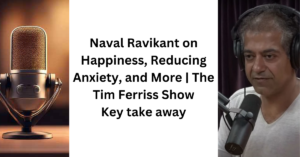Naval Ravikant on Happiness, Reducing Anxiety, and More.The Tim Ferriss Show. Key take aways.

The Host: Tim Ferriss is an entrepreneur, and author known for his bestseller book “The 4-Hour Workweek”, which popularized the idea of smart work and productivity.
The Guest: Naval Ravikant is an entrepreneur, investor, and thinker, he gives his insights on wealth, happiness, and decision-making. He co-founded AngelList and invested early in Twitter, Uber, and Notion. His wisdom on financial freedom and personal growth has inspired many people.
What Happens When Great Minds Collide? Its simple, right? it explodes wisdom for life.
Mind you, the thoughts shared in this discussion are simple yet extraordinary, it could potentially add value to your life.
Here are some of the thought provoking issues discussed:
Breaking down the most Powerful Takeaways:
How to win the Game?
Ravikant believes life involves playing “games,” such as family, school, career, and social pursuits. The importance of knowing when you have “won” a game so you can be free of it, rather than continuing to play it indefinitely, driven by anxiety and a desire for more. The goal is to consciously choose which games to play and to avoid getting trapped in them, which can prevent you from enjoying the present.
How an Examined Life Boosts Mental Well-Being?
Ravikant emphasizes taking responsibility for one’s own happiness and peace of mind. He suggests anxiety often arises from an “unexamined life”. To counter this, he advocates for self-examination through meditation, philosophy, and introspection.
How to Leverage Specific Knowledge and Equity for Success?
Ravikant underscores the possibility of creating wealth ethically and systematically. A critical component is owning equity in a business and leveraging specific knowledge to “productize yourself”. This approach allows individuals to benefit directly from their unique skills and efforts, leading to financial freedom.
Long-Term Thinking and Avoiding Short-Term Traps: The discussion highlights the importance of choosing long-term benefits over short-term gratification. Ravikant cautions against “cheap dopamine” and encourages finding activities that are enjoyable and sustainable in the long run. He also touches on the need to be aware of the “games” people play in life and to recognize when it’s time to stop playing them to avoid getting trapped in endless cycles of seeking external validation.
Best Quotes from the Podcast
“You always want to strive for understanding, not for memorization. You should be able to rearticulate it five different ways in every language that you know, otherwise you don’t really understand it.”
“You’re not going to get rich renting out your time. You must own equity—a piece of a business—to gain your financial freedom.”
“The first principle is that you must not fool yourself—and you are the easiest person to fool.”
“I learned very early the difference between knowing the name of something and knowing something.”
“The reason to win the game is so that you can be free of it.”
“The modern devil is cheap dopamine.”
“All self-help boils down to choose long term over short term.”
“Money doesn’t make you happier it takes care of your money problems but it’s not necessarily going to put you in a place where you’re in some kind of bliss all the time”
“I am taking responsibility for my own happiness and peace and quality of life and one of the things you learn after you make money is that money doesn’t make you happier.”
“If you secretly despise wealth it will elude you but mind you ethical wealth creation is possible”
6(six)Actionable Ravikant’s Insights for a Better Life.

Prioritize Self-Examination and Mental Well-being:
“Incorporating self-examination practices, such as meditation, sitting for 60 minutes every day for at least 60 days, letting the mind do what it wants without forcing anything”
Read philosophy, especially before bed. Ravikant recommends books from Osho, Anthony Demelo, and Krishnamurti.
Consciously decide to take responsibility for your own happiness, peace, and quality of life.
Pursue Ethical Wealth Creation by Leveraging Specific Knowledge:
Work towards owning equity in a business to gain financial freedom.
Identify and leverage your specific knowledge, skills, and accountability to create a valuable product or brand.
Adopt Long-Term Thinking:
Consistently opt for choices that offer long-term benefits over short-term gratification.
Be aware of the modern “devil” of cheap dopamine and seek more sustainable sources of fulfilment.
Focus on the long term, recognizing that compound interest applies to relationships, money, and health.
Be Mindful of the “Games” You Play:
Be aware of the various “games” society presents, such as those related to family, career, and social status.
Determine what “winning” means to you in these games, and once achieved, be willing to disengage to avoid endless striving.
If you’re on this planet you might as well play something. If choosing to play, select games that align with your values and provide intrinsic satisfaction.
Embrace Continuous Learning and Unlearning:
Be willing to unlearn old habits and beliefs, and approach new situations with a fresh, open perspective.
Prioritize understanding principles over memorizing jargon.
Develop a love for reading by starting with enjoyable material and gradually progressing to more challenging content.
Be Self-Aware and Authentic:
Strive for self-awareness and avoid self-deception.
Choose relationships with kind people, as this reflects their fundamental nature.
Don’t seek external sources of pleasure or happiness all the time.
My thoughts
In my opinion Ravi operates in such clarity of mind and thoughts.
He understands and sees the immense potential of what humans are capable of when guided and given the right knowledge to live not just right but also well balanced meaningful live.
His insights are simple yet immensely profound, helpful and doable.
So why not try some of Ravi’s thoughts and beliefs to become better, stronger and healthier. for more Ravikant’s Insights read his book.
What resonated with you?
“One thing that resonated with me is that, at times, we want to pursue something, but society expects us to follow what is generally accepted. For me, learning to shift my mindset from societal norms to what I truly want to be or become—without being overly critical of those norms—is something I would like to learn and take away from this.”
What are your Humanly thoughts?
Here are some of the notable books recommended in the Podcast.
The Almanac of Naval Ravikant by Eric Jorgensen
So What Do You Care What Other People Think? by Richard Feynman
The Great Challenge by Osho
The Way to Love by Anthony de Mello.
Awareness by Anthony de Mello
The Untethered Soul by Michael Singer
Think on These Things and The Book of Life Jiddu Krishnamurti
Direct Truth by Kabil Gupta
Finite and Infinite Games by James Carse
The 4-Hour Body by Tim Ferriss
